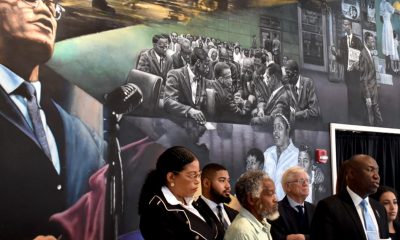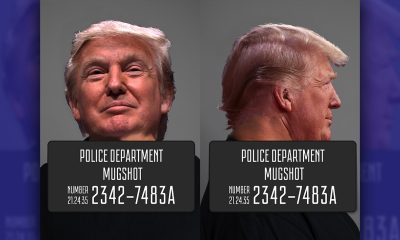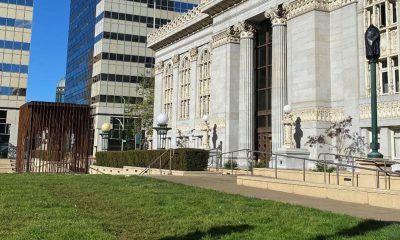National
In NY, a Special Prosecutor for Police Killings, For Now

In this Sept. 14, 2014, file photo, New York State Attorney General Eric Schneiderman speaks during the annual meeting of the Business Council of New York State at the Sagamore Resort in Bolton Landing, N.Y. Amid national debate over holding officers criminally accountable for killings by police, New York is giving such cases special consideration by appointing the attorney general to investigate them, for now. (AP Photo/Mike Groll, File)
JENNIFER PELTZ, Associated Press
NEW YORK (AP) — Amid national debate over holding officers criminally accountable for killings by police, New York is giving such cases special consideration by appointing the attorney general to investigate them, for now.
The move comes after police officers weren’t criminally charged last year in deadly encounters with unarmed men in New York and elsewhere. Critics pressed to take such cases away from local district attorneys, arguing they didn’t have enough professional distance to investigate and prosecute police who help them build cases.
With lawmakers unable to agree on an approach as the legislative session ended, Gov. Andrew Cuomo announced Tuesday he’d use executive power to appoint Attorney General Eric Schneiderman for a year as special prosecutor for police killings.
“I don’t believe this is the perfect alternative, but I believe it is the best alternative at this time,” said Cuomo, adding that he’d keep working toward legislation next year.
Some advocates who called for reform are praising the move. But district attorneys say it usurps a role they believe they play fairly and honorably, and relatives of people killed in New York police encounters say the temporary measure doesn’t go far enough.
“We do not want to be exploited for the sake of politics and something that has little practical impact on ensuring justice for our communities,” said the families of nine slain people, including Eric Garner, whose chokehold death in New York City last year prompted widespread protests.
Around the country, special prosecutors sometimes handle police-misconduct probes. Maryland has a permanent special prosecutor for police wrongdoing and some other cases. New York state had a special office investigating New York City police corruption from 1972 to 1990.
But the idea gained new urgency after last year’s deaths of Garner and Michael Brown in Ferguson, Missouri. Both were black, unarmed and killed in encounters with white officers whom grand juries declined to indict.
Critics questioned how local prosecutors had conducted the grand jury process, particularly after few details were made public about the Garner grand jury sessions. Extensive records were released about Brown’s case in Missouri, which has different public records laws. Nonetheless, Missouri lawmakers this year weighed — but ultimately didn’t pass — several proposals to appoint special prosecutors in police killings.
Following the Garner case, Schneiderman asked Cuomo to give him the authority to investigate deaths at the hands of police. New York City’s elected public advocate, Letitia James, and some state lawmakers pushed for appointing special prosecutors in such cases. Hip-hop impresario Russell Simmons personally pressed Cuomo on the issue, rapper-actor Common joined a New York City Hall rally calling for special prosecutors and other changes, and rap star Jay Z also met with Cuomo to talk reform.
James called the yearlong special prosecutor appointment “a major step forward.” Schneiderman said he was disappointed that the legislature had not acted but added that his office would “handle these cases with the highest level of care and independence.”
District attorneys say they do the same and the state has no business taking over a responsibility they were elected to shoulder.
“There’s this false narrative out there that prosecutors turn their heads when the accused is a police officer, and that’s just not true,” said Frank Sedita III, the president of the state district attorneys’ association. He’s the DA in Buffalo-area Erie County, where a police officer is currently on trial in a theft case.
The former Staten Island DA who handled the Garner case, now-Rep. Daniel Donovan, continues to believe DAs should handle such cases unless there’s a specific conflict of interest, his office said. Current acting Staten Island DA Daniel Master declined to comment.
Indeed, local prosecutors in Baltimore and North Charleston, South Carolina, brought cases that produced indictments of officers in two high-profile police killings this year.
___
Associated Press writer Michael Virtanen in Albany contributed to this report. Reach Jennifer Peltz on Twitter @ jennpeltz.
Copyright 2015 The Associated Press. All rights reserved. This material may not be published, broadcast, rewritten or redistributed.
Barbara Lee
Congresswoman Barbara Lee Issues Statement on Deaths of Humanitarian Aid Volunteers in Gaza
On April 2, a day after an Israeli airstrike erroneously killed seven employees of World Central Kitchen (WCK), a humanitarian organization delivering aid in the Gaza Strip, a statement was release by Rep. Barbara Lee (D-CA-12). “This is a devastating and avoidable tragedy. My prayers go to the families and loved ones of the selfless members of the World Central Kitchen team whose lives were lost,” said Lee.

By California Black Media
On April 2, a day after an Israeli airstrike erroneously killed seven employees of World Central Kitchen (WCK), a humanitarian organization delivering aid in the Gaza Strip, a statement was release by Rep. Barbara Lee (D-CA-12).
“This is a devastating and avoidable tragedy. My prayers go to the families and loved ones of the selfless members of the World Central Kitchen team whose lives were lost,” said Lee.
The same day, it was confirmed by the organization that the humanitarian aid volunteers were killed in a strike carried out by Israel Defense Forces (IDF). Prior to the incident, members of the team had been travelling in two armored vehicles marked with the WCF logo and they had been coordinating their movements with the IDF. The group had successfully delivered 10 tons of humanitarian food in a deconflicted zone when its convoy was struck.
“This is not only an attack against WCK. This is an attack on humanitarian organizations showing up in the direst situations where food is being used as a weapon of war. This is unforgivable,” said Erin Gore, chief executive officer of World Central Kitchen.
The seven victims included a U.S. citizen as well as others from Australia, Poland, the United Kingdom, Canada, and Palestine.
Lee has been a vocal advocate for a ceasefire in Gaza and has supported actions by President Joe Biden to airdrop humanitarian aid in the area.
“Far too many civilians have lost their lives as a result of Benjamin Netanyahu’s reprehensible military offensive. The U.S. must join with our allies and demand an immediate, permanent ceasefire – it’s long overdue,” Lee said.
Commentary
Commentary: Republican Votes Are Threatening American Democracy
In many ways, it was great that the Iowa Caucuses were on the same day as Martin Luther King Jr. Day. We needed to know the blunt truth. The takeaway message after the Iowa Caucuses where Donald Trump finished more than 30 points in front of Florida Gov. De Santis and former South Carolina Governor Nikki Haley boils down to this: Our democracy is threatened, for real.

By Emil Guillermo
In many ways, it was great that the Iowa Caucuses were on the same day as Martin Luther King Jr. Day.
We needed to know the blunt truth.
The takeaway message after the Iowa Caucuses where Donald Trump finished more than 30 points in front of Florida Gov. De Santis and former South Carolina Governor Nikki Haley boils down to this: Our democracy is threatened, for real.
And to save it will require all hands on deck.
It was strange for Iowans to caucus on MLK day. It had a self-cancelling effect. The day that honored America’s civil rights and anti-discrimination hero was negated by evening.
That’s when one of the least diverse states in the nation let the world know that white Americans absolutely love Donald Trump. No ifs, ands or buts.
No man is above the law? To the majority of his supporters, it seems Trump is.
It’s an anti-democracy loyalty that has spread like a political virus.
No matter what he does, Trump’s their guy. Trump received 51% of caucus-goers votes to beat Florida Gov. Ron DeSantis, who garnered 21.2%, and former South Carolina Gov. Nikki Haley, who got 19.1%.
The Asian flash in the pan Vivek Ramaswamy finished way behind and dropped out. Perhaps to get in the VP line. Don’t count on it.
According to CNN’s entrance polls, when caucus-goers were asked if they were a part of the “MAGA movement,” nearly half — 46% — said yes. More revealing: “Do you think Biden legitimately won in 2020?”
Only 29% said “yes.”
That means an overwhelming 66% said “no,” thus showing the deep roots in Iowa of the “Big Lie,” the belief in a falsehood that Trump was a victim of election theft.
Even more revealing and posing a direct threat to our democracy was the question of whether Trump was fit for the presidency, even if convicted of a crime.
Sixty-five percent said “yes.”
Who says that about anyone of color indicted on 91 criminal felony counts?
Would a BIPOC executive found liable for business fraud in civil court be given a pass?
How about a BIPOC person found liable for sexual assault?
Iowans have debased the phrase, “no man is above the law.” It’s a mindset that would vote in an American dictatorship.
Compare Iowa with voters in Asia last weekend. Taiwan rejected threats from authoritarian Beijing and elected pro-democracy Taiwanese vice president Lai Ching-te as its new president.
Meanwhile, in our country, which supposedly knows a thing or two about democracy, the Iowa caucuses show how Americans feel about authoritarianism.
Some Americans actually like it even more than the Constitution allows.
About the Author
Emil Guillermo is a journalist and commentator. He does a mini-talk show on YouTube.com/@emilamok1.
Activism
Oakland Post: Week of April 10 – 16, 2024
The printed Weekly Edition of the Oakland Post: Week of April 10 – 16, 2024

To enlarge your view of this issue, use the slider, magnifying glass icon or full page icon in the lower right corner of the browser window. ![]()
-

 Activism4 weeks ago
Activism4 weeks agoOakland Post: Week of March 20 – 26, 2024
-

 #NNPA BlackPress3 weeks ago
#NNPA BlackPress3 weeks agoCOMMENTARY: D.C. Crime Bill Fails to Address Root Causes of Violence and Incarceration
-

 #NNPA BlackPress3 weeks ago
#NNPA BlackPress3 weeks agoMayor, City Council President React to May 31 Closing of Birmingham-Southern College
-

 #NNPA BlackPress3 weeks ago
#NNPA BlackPress3 weeks agoFrom Raids to Revelations: The Dark Turn in Sean ‘Diddy’ Combs’ Saga
-

 #NNPA BlackPress3 weeks ago
#NNPA BlackPress3 weeks agoCOMMENTARY: Lady Day and The Lights!
-

 #NNPA BlackPress3 weeks ago
#NNPA BlackPress3 weeks agoBaltimore Key Bridge Catastrophe: A City’s Heartbreak and a Nation’s Alarm
-

 #NNPA BlackPress3 weeks ago
#NNPA BlackPress3 weeks agoBaltimore’s Key Bridge Struck by Ship, Collapses into Water
-

 Activism3 weeks ago
Activism3 weeks agoOakland Post: Week of March 27 – April 2, 2024




















































